| Eleanor Alice Burford Hibbert | Home | Jean Plaidy Titles |
| Norman Series | Plantagenet Series | Tudor Series | Stuart Series | Georgian Series | Queen Victoria Series | Queens of England Series | Trilogies, Italy, France and Spain | Other Titles |
| Plantagenet Series |
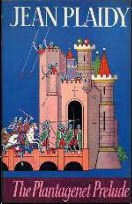 |
Plantagenet Prelude Vol. 1
January 1976 Robert Hale
The King, the Queen and the archbishop who dominated the dawn of the Plantagenet epoch.
Eleanor of Aquitaine -- romantic and beautiful Queen of the 'Courts of Love', scandalizing Christendom by her infidelity to her husband the King of France.
Henry, Duke of Normandy and great-grandson of William the Conquerer. When Eleanor saw him, twelve years her junior, she was determined that Henry should be her husband.
Thomas a Becket, the merchant's son, who rose to become a saint and a martyr. Beloved and hated in turn by Henry his king, Becket's course moved inexorably toward the tragedy of blood and steel before the high altar at Canterbury.
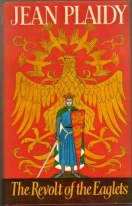
Revolt of the Eaglets Vol. 2
March 10, 1977
Thomas a Becket had been murdered and the whole of Christendom accused Henry Plantagenet of the murder. Henry was at the height of his powers but beset by frustration, most of which came from his own family, for his wife Eleanor of Aquitaine hated him and had sown discontent and resentment in their children. When Eleanor discovered Rosamund's Bower, the secret abode of Henry's mistress Rosamund Clifford, her hatred was so intense that she determined to destroy him. Henry had a secret to hide. He had seduced the daughter of the King of France when she was a child and had come to England to be brought up there as she was betrothed to his son Richard. His determination to keep her had it's effect on the political scene. His sons were working against him and each other; and the King, growing old, sentimentally yearning for the affection which none had to give, saw himself as an old eagle attacked by the three eaglets whom he had begotten, while the fourth on whom he had fixed his last hopes awaited the moment of his utter defeat to pluck his eyes out.
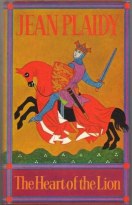
Heart of the Lion Vol. 3
January 1977 Robert Hale
Henry II was dead and his son Richard had come to the throne. He had vowed to win back Jerusalem for the Christian world and was ready to place his Kingdom in jeopardy to fulfill that vow even though his treacherous brother John was casting covetous eyes on the crown. Richard's life was one fantastic adventure after another, but this is not merely an account of full-blooded adventure; it is also the revelation of the strange nature of England's most romantic King.
Here is the color and splendor of an age when chivalry and cruelty went side by side. It is inhabited by the shrewd King of France who was tormented by the emotions aroused in him by his natural enemy; Berengaria, Richard's Queen, who could never hold the place in his life for which she longed; Joanna his sister who adored and yet defied him; Prince John, his violent and treacherous brother; aged Queen Eleanor living on as vital as ever. And dominating them all was the fearless, romantic monarch who, the world said, had the heart of a lion.
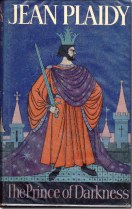
Prince of Darkness Vol. 4
January 1978 Robert Hale
The untimely death of Richard Coeur de Lion left his nephew Arthur and his younger brother John in contest for the throne of England.
Reluctantly the barons chose John and their choice brought years of evil upon the realm. His unbridled sensuality, his fierce and terrible temper, his cruelty, idleness and injustice made King John hated and feared.
Men came to believe that the House of Anjou was tainted by the devil's blood, that the loathsome monarch was himself Evil Incarnate, the very Prince of Darkness...
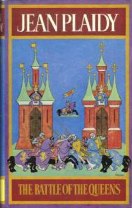
Battle of the Queens Vol. 5
January 1978 Robert hale
During the first half of the thirteenth century, two women dominated the scene. They were Isabella of Angouleme who had been Queen of England, and Blanche of Castile, who was Queen of France.
Isabella - one of the most sensually alluring women who ever lived and was in her days compared with Helen of Troy - became the wife of King John and the mother of Henry III. Blanche was the wife of Louis VIII and mother of Louis IX.
After the death of John, Isabella took her daughter to Lusignan in order that she might be prepared for marriage with Count Hugh, Isabella's lover of long before; but when she saw him she decided to marry him herself. Thereafter he became her slave. Reckless, proud, vindictive, Isabella was determined to have her own way; and she and Blanche hated each other from the moment they first met. There could not have been two women less alike than the darkly flamboyant, passionate Isabella and the serenely virtuous blonde Blanche. Two qualities they shared though - beauty and ambition.
Those were turbulent days for England. The French were actually on English soil when Henry came to the throne, but those sturdy barons, William Marshall and Hubert de Burgh, were determined to restore England to the English.
King John's young family were growing up and each going his or her different way - some happy, some tragic. There was Joan, cheated of the man she loved by her own mother; young Isabella who became the petted wife of an Emperor; Eleanor who made a secret match with Simon de Montfort, a man who was later to make his mark on English history; Richard, the bold younger brother, who was certain that he should have been the first born and inherited the crown; and Henry, in these days unsure of himself and determined that none should forget that he was the King.
The French Court was dominated by Blanche first with her husband Louis, the kindly man who lacked the strength necessary to a violent age, and afterward with her son Louis IX
In opposition to Blanche was Isabella, with her husband Hugh, determined to destroy Blanche and stop at nothing - not even murder - in her efforts to do so.
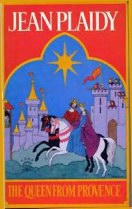
Queen from Provence Vol. 6
January 1979 Robert Hale
Marguerite, eldest daughter of the Count of Provence, had married a king of France. Her sister, the beautiful Eleanor, was determined that she would make as grand a match.
Good fortune and wily cunning brought her Henry of England for a husband. A good and generous husband, but a weak king, he ruled a nation that still remembered his cruel and foolish father, King John.
Henry showered gifts on the bride who soon made him her slave in love. His extravagance forced him to levy even greater taxation on the land, until the specter of revolt loomed against him. For Simon de Montfort, the adventurer who would give England its first true parliament, the hour of destiny was at hand...
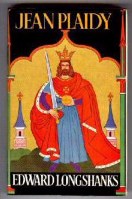
Edward Longshanks (Hammer of the Scots) Vol. 7
October 4 1979 Robert Hale
Published in North America under the title Hammer of the Scots
The news of Henry III's death reached his son Edward on the long road home from the Holy Land. Now he was England's King and a man fit for his destiny.
Through all the years of his reign, through stark personal tragedy and chill forebodings as his son grew into a weak, corrupted prince, Edward I strove to weld a nation united from England and Scotland and Wales.
When the mighty Wallace raised the Scots in arms and the Welsh Llewellyn strove for power, Edward stood firm to his resolve, still knowing in his heart how much would be lost when his crown passed down to his dissolute son...
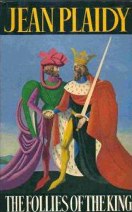
Follies of the King Vol. 8
January 1980 Robert Hale
Edward the second's first act on coming to the throne was to recall Piers Gaveston whom his father had banished because he thought he was having an evil influence on his son, and the new King's devotion to the shrewd and avaricious Gaveston soon became a scandal. It was thought, however, that when Edward married the Princess who was reckoned to be one of the most beautiful in Europe, his inclinations would change. But nothing could make him swerve from his attachment to Gaveston, and Gaveston was clearly the man to make the most of royal favor.
The new Queen Isabella, accustomed to adulation, was at first nonplussed by the King's attitude and then bitterly humiliated; and she was not a woman to forget or forgive. The country was in turmoil. The death of the first Edward had given the Scots the chance they had longed for, and Robert the Bruce was the man to take advantage of it in such a way that he was finally able to defeat the English at Bannokburn. The influential barons rose in protest against the rule of Gaveston and led by the King's cousin, Lancaster, threatened civil war. Gaveston's arrogance and the King's folly in due course led to the murder on Blacklow Hill.
But when the handsome Hugh le Despenser was brought to the King's notice there was another to take Gaveston's place in his affections.
The King was making enemies throughout the country but he did not realize that the most deadly of these was the Queen. Cleverly biding her time Isabella waited until her schemes could mature, and when she met and fell madly in love with Roger de Mortimer, she knew the time had come; they worked together to overthrow the man who had humiliated her by showing his preference for handsome young men.
Alluring, powerful and ruthless Isabella emerges as the triumphant conqueror while Edward plunges along that road on which his follies have set him and which ends in history's most horrific murder within the thick dark walls of Berkeley Castle.
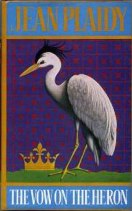
Vow on the Heron Vol. 9
October 9, 1980
Edward the Third had come to the throne through the conniving of his mother. He was but a boy. Even so, the Queen did not want him inquiring too deeply into the death of his father, who had been brutally murdered because of her and her lover, Roger de Mortimer.
To distract Edward she allowed him to marry the lovely and gracious Philippa of Hainault, with whom he had fallen in love at first sight.
When it began to be said that Edward had a claim to the French throne, he allowed himself to be goaded into challenging the King of France. It was Robert of Artois, a consummate troublemaker, who urged Edward on, likening him to a heron, a cowardly bird.
Edward then swore on the heron that he would attack France. This vow changed the course of history, for it heralded the beginning of the Hundred Year's War.
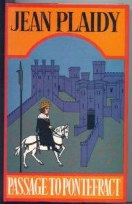
Passage to Pontefract Vol. 10
March 5, 1981 Robert Hale
For a while the people loved their beautiful young king, Richard II. But then his extravagances and his indifference to the peoples' needs aroused their wrath.
John of Gaunt, his uncle, watched all this with great interest. Nothing could slake his thirst for the throne, not even his beautiful wife, Catherine.
Here is a vivid picture of Richard's court, of his spendthrift ways, his folly, his devotion to his favorite, Robert de Vere, and his love for two Queens. And most of all, of his headlong journey toward disaster.
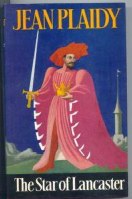
Star of Lancaster Vol. 11
January 1981 Robert Hale
Richard II was losing his hold on the crown and ambitious eyes were turning toward it. Henry of Bolingbroke, son of John of Gaunt, had married the heiress Mary de Bohun and by her had six children, the eldest of whom was Harry of Monmouth.
Bolingbroke was exiled by the King but returned to England when Richard confiscated John of Gaunt's estates. Bolingbroke came to claim them - and at the same time the crown.
Richard was deposed and died mysteriously, murdered it was said on the order of Bolingbroke, now King Henry the Fourth. But Henry found the crown harder to hold than to win. He was beset by enemies - the Welsh, the Scots and the mighty Hotspur; the country was rumbling with revolt against the King whom many called the Impostor. In addition to these worries Henry suffered anxiety about the loathsome disease which was threatening to destroy him, and he was also worried over the rebellious behavior of his son.
Dominating the court was Harry of Monmouth, his fingers itching to take the crown, his reckless conduct causing scandal since he frequented disreputable company in the low-class taverns of East Cheap with his crony Sir John Oldcastle.
There came a time when the disease which had caused the King to hide away claimed him and Harry became King Henry the Fifth. The change was miraculous both for him and Oldcastle. The licentious youth became the great King, and the rake Oldcastle turned into a religious reformer. Oldcastle ultimately was a martyr to his cause and Harry became the conquering hero of Agincourt.
The star of Lancaster was in the ascendant. Harry had brought France to her knees and married her Princess. It seemed that the long war was at an end. But a greater enemy than the French awaited Harry, and the rising star of Lancaster was finally to depend on a nine-month-old child.
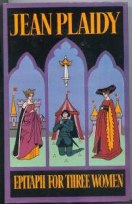
Epitaph for Three Women Vol. 12
November 5, 1981 Robert Hale
This book is about Catherine of Valois, Joan of Arch, and Eleanor, Duchess of Gloucester. The first third of the book tells the story of Catherine. Part two tells the story of Joan d’Arc, the peasant girl who goes into battle against the undefeated English army – and succeeds. The final part of the book relates the story of Eleanor of Gloucester, the overly and egotistical wife of Henry VI’s uncle, Humphrey of Gloucester, Lord Protector of the Realm. This title makes him next in line for the throne should young Henry VI die. Eventually, Eleanor’s forceful ambition to be Queen leads to her being charged with sorcery.
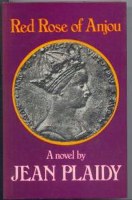
Red Rose of Anjou Vol. 13
January 1982 Robert Hale
Margaret of Anjou came to England and married King Henry VI. Born to a family of strong women, Margaret was no exception. She was passionate, impulsive, loving, violent, and more enamored of the crown than of her peace - loving husband.
Henry was king, but the Earl of Warwick - known as the Kingmaker - supported Richard of York. In a fateful scene in the Temple Gardens, as men were called to pluck a rose to show which side they stood, Richard and Henry were on opposing sides. It was a prelude to the War of the Roses.
In this turbulent period amid the fortunes of war, men who loved power took center stage, and Henry, poor ineffectual Henry, wished only to be left alone with his books and his music. Yet his wife, Margaret, schemed for his power, and later for his son's, and rushed headlong into disaster.
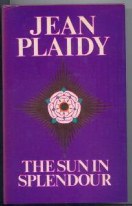
Sun in Splendour Vol. 14
January 1982 Robert Hale
The Sun of York was in the ascendant and Edward IV had taken the crown with the help of Warwick, the Kingmaker. Warwick had plans for a French alliance but Edward had fallen in love with Elizabeth Woodville after a meeting in the forest contrived by her and her mother.
So fervent was the King's passion for the beautiful widow who refused to become his mistress that the marriage, which was to shake the foundations of the King's friendship with Warwick, took place. Disaster was inevitable, but, towering above those about him, reckoned to be the most handsome man in the country, strong yet affable, Edward rose above it and proved himself to be a King in the mold of the more illustrious of his Plantagenet ancestors.
But his love of what was called "luxurious living" began to have its effect; he was sexually insatiable and his mistresses were numerous. Elizabeth, however, knew how to keep her place and through the years provided him with many children, among them Edward V and his brother Richard Duke of York who, in later days, became known as the Princes in the Tower and whose fate has become one of the most intriguing mysteries of all time.
Edward's most trusted supporter was his brother Richard Duke of Gloucester and his worst enemy his brother George, Duke of Clarence. George's perfidy brought him to a violent end in the Tower of London but Richard lived on to become the Lord Protector and briefly to wear the crown.
At the center of events was Edward, splendid in appearance and beloved of the people. His favorite device was that of the sun in all its splendour surrounding the white roses of York. Two women he loved above all the others played their part in history - his cool calculating Queen and Jane Shore, the warm hearted goldsmith's wife.
He lived recklessly and when, on his death, an incident from his past came to light. Its effect was to change the course of history.
Richard came to the throne but there was one other waiting to take the crown - a man whose very legitimacy was suspect. And so came the fatal confrontation on Bosworth Field which resulted in the coming of Tudor and the end of the long saga of Plantagenet Kings.




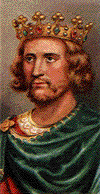


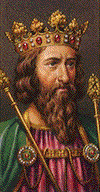
Henry II Richard I John Henry III Edward I Edward II Edward III







Richard II Henry IV Henry V Henry VI Edward IV Edward V Richard III

Eleanor of Aquitaine
Henry II (1133-1189)son of Empress Matilda and Geoffrey V, Count of Anjou married Eleanor of Aquitaine (1120-1204)
they had five sons; William, Henry, Richard I, Geoffrey and John and three daughters; Matilda, Eleanor and Joanna
Richard I (1157-1199) married Berengaria of Navarre (1163-1230)
they had no children
John (1166-1216) married Isabel of Angouleme (1187-1246)
they had two sons; Henry III and Richard, and three daughters; Joan, Isabel and Eleanor
Henry III (1207–72) married Eleanor of Provence (1223-1291)
they had six sons; Edward I, Edmund, Richard, John, Henry and William, and three daughters; Margaret, Beatrice and Katherine
Edward I (1239-1307)married first Eleanor of Castile (1246-1290)
they had 4 sons; John, Henry, Alphonso, Edward II, and 10 daughters; Joan, Katherine, Joan, Margaret, Mary, Isabel, Alice, Elizabeth, Beatrice, Blanche
married second Margaret of France(1282-1318)
they had two sons; Thomas and Edmund, and one daughter; Eleanor
Edward II (1284-1327) married Isabel of France (1292-1358)
they had two sons; Edward III and John, and two daughters; Eleanor and Joan
Edward III (1312-1377) married Philippa of Hainault (1314-1369)
they had eight sons; Edward, William, Lionel, John, Edmund, Thomas, William and Thomas, and five daughters; Isabel, Joan, Blanche, Mary and Margaret
Edward (1330-1376) was known as The Black Prince he married Joan Plantagenet (the "Fair maid of Kent") (1328–1385)
they had two sons; Edward and Richard II
Richard II (1367-1400) married first Anne of Bohemia (1366–1394)
no children
married second Isabel of Valois who was just 7 at the time
no children
John, son of Edward II and Isabel of France married Blanche of Lancaster
they had one son; Henry IV and two daughters; Philippa and Elizabeth
Henry IV (1367-1413) married first Mary Bohun
they had five sons; Edward, Henry V, Thomas, John and Humphrey, and two daughters; Blanche and Philippa
married second Joanna of Navarre
no children
Henry V (1387-1422) married Katherine Valois (1401-1437)
they had one son Henry VI
Henry VI (1421-1471) married Margaret of Anjou (1430-1482)
they had one son; Edward Plantagenet, Prince of Wales
Edward IV son of Richard Plantagenet and Cecily Neville married Elizabeth Woodville (1437-1492)
they had three sons; Edward V, Richard and George, and eight daughters; Elizabeth of York, Mary, Cecily, Margaret, Anne, Katherine and Bridget
Edward V (1470-1483) did not marry
Richard III (1452-1485), brother to Edward IV, married Anne Neville
they had one son; Edward of Middleham, Prince of Wales
Elizabeth of York (Daughter of Edward IV) married Henry VII (1421-1471)